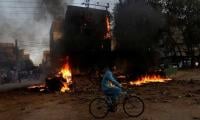ISLAMABAD: The 17th Extraordinary Session of the OIC Council of Foreign Ministers Sunday agreed on providing all help to Afghanistan on humanitarian grounds.
The special meet, convened to take up the humanitarian situation in Afghanistan, adopted a lengthy 30-point resolution, which importantly, focused on serious liquidity challenges that Kabul faces and resolved to continue focusing on measures to ease access to legitimate banking services.
Pakistan had earlier suggested the creation of a vehicle within the OIC to channel immediate and sustained humanitarian and financial support to the Afghan people, including from pledges by the OIC member states and other donors, and this suggestion was included in the Resolution.
The OIC expressed deep alarm at the worsening economic situation in Afghanistan, which is further compounded by the continued freeze of overseas Afghan assets as well as other international assistance, exacerbating the urgent cash-flow problems, including payment of remuneration to public officials, and hindering the provision of essential public and social services to the people of Afghanistan.
While no concrete pledges were made at the conference, the understanding is that first a ‘vehicle’ had to be set up inside Afghanistan, through which later those who wanted to donate could send funds both from the OIC countries and Western capitals, who had earlier complained that there was no financial channel available.
The immediate first step is to establish a Humanitarian Trust Fund, under the aegis of the Islamic Development Bank, to serve as a vehicle to channel humanitarian assistance to Afghanistan including in partnership with other international actors.
It has been decided that it will be the OIC that will play a leading role in the delivery of humanitarian and development aid to the people of Afghanistan, and it will also find ways and means to unlock banking and financial channels to resume liquidity.
The IDB has been asked to expeditiously operationalise the Humanitarian Trust Fund by the first quarter of 2022.
The OIC General Secretariat, together with the IDB and Humanitarian Trust Fund, will commence discussions with the UN system organisations to device a roadmap, for mobilising actions in relevant fora to unlock the financial and banking channels, to resume liquidity and flow of financial and humanitarian assistance, and to devise a mechanism for the disbursement of urgent and sustained humanitarian assistance to the people of Afghanistan.
The Resolution called on the OIC member states, the Islamic Financial Institutions, donors and other international partners to announce pledges to the Humanitarian Trust Fund for Afghanistan as well as to provide humanitarian assistance to Afghanistan.
Important is that the OIC General Secretariat has been asked to take immediate steps to reinforce the OIC Mission in Kabul with human, financial and logistical resources, enabling it to forge global partnerships and streamline aid operations on the ground.
The Resolution underscored that that Afghanistan's access to its financial resources would be pivotal in preventing a collapse and in reviving the economic activity and in this regard, recognises the importance of taking related actions such as unlocking the channels of financial and in-kind flow of assistance and resources to the people of Afghanistan, and exploring realistic pathways towards unfreezing Afghanistan's financial assets.
A decision was taken to appoint Ambassador Tarig Ali Bakheet, Assistant Secretary General for Humanitarian, Cultural and Family Affairs at the OIC General Secretariat, as Special Envoy of the Secretary General of the OIC for Afghanistan, supported by a secretariat and the OIC Office in Afghanistan to coordinate aid and assistance efforts, and mandated to pursue economic and political engagement with Afghanistan, and to submit periodic reports;
The OIC has asked the United Nations system in particular UN High Commissioner for Refugees (UNHCR), UN Office for Coordination of Humanitarian Affairs (OCHA), World Food Programme (WFP), United Nations International Children's Emergency Fund (UNICEF), United Nations Development Programme (UNDP), to pursue joint operation with the OIC for the delivery of urgent humanitarian aid.
It has also been decided to launch an Afghanistan Food Security Programme, and has requested the Islamic Organisation for Food Security (IOFS) to undertake necessary work in this regard using the capacity of the Organization's Food Security Reserves, when necessary.
On the political side, the Resolution has urged Afghanistan to abide by the principles and purposes enshrined in the UN Charter and the Charter of the OIC. It also urged it to respect its commitments under international agreements and conventions, including its obligations under international human rights covenants, especially with regard to the rights of women, children, youth, elderly and people with special needs as well as the preservation of family values, as enshrined in Islamic teachings and principles.
Afghanistan has been asked to take concrete steps against all terrorist organisations in particular al-Qaeda, Deash and its affiliates ETIM, and TTP, and reaffirmed the importance of combating terrorism in Afghanistan and ensuring that the territory of Afghanistan is not used as a platform or safe haven by any terrorist group or organisation.
Afghan authorities have been called to continue to work towards greater inclusiveness and including by developing a roadmap to strengthen participation of all Afghans including women and girls to participate in all aspects of the Afghan society.
The Resolution also emphasised the importance of establishing inclusive governmental structures which adopts moderate and sound domestic and foreign policies, with a friendly approach towards neighbours of Afghanistan, aimed at realising the shared goals of durable peace, security, safety and long-term prosperity of Afghanistan and the region.
Earlier in the morning session, while delivering the keynote address, Prime Minister Imran Khan once again warned that if the world did not act now, the situation inside Afghanistan would turn into the biggest man-made crisis in the world. He pointed out that no other country had suffered as much as Afghanistan, adding that even before the Taliban seized control, half of the population was living below the poverty line. He said that 75 per cent of the country's budget was also supported by foreign aid.
Pointing to the US, Khan said that it was time now to delink the Taliban government from its 40 million citizens at a time when chaos would see the country fail to fight terrorism.
PM Imran said the threat of terrorism from ISIL [Islamic State of Iraq and the Levant] could only be tackled effectively through an economically stable government in Afghanistan.
He spoke in the presence of the representatives from the 30 OIC member states as well as the United Nations Secretary General, China, the US, the UK, France, Russian Federation, Japan, Germany, Italy, European Union, Economic Cooperation Organisation, League of Arab States and the Gulf Cooperation Council and Taliban government in Afghanistan.
OIC Secretary General Hissein Brahim Taha, while speaking in the session, said: "By hosting this event, Pakistan reaffirms its total commitment to the issues facing the Muslim community with a keen dedication to security and peace for region and world".
He called upon all parties concerned to cooperate with the OIC mission in Kabul to provide relief to the affected Afghans.
The Chair of the session Foreign Minister of Saudi Arabia, Prince Faisal bin Farhan Al Saud said that the economic difficulties could trigger a humanitarian crisis and lead to further instability which could impact regional and international peace.
"The people of Afghanistan have suffered for too long," he said, adding that they had faced years of instability.
The Saudi minister urged OIC member states to play their role in providing the Afghans with the necessary support and to prevent an economic collapse in the country.
He said that the Kingdom also condemned terrorist actions targeting minorities in Afghanistan.
"We promote peace and security as it requires cooperative action from the international community," he said.
Police say that ten people were killed in Abuja and “many others” in Okija
Ministry says three drones were destroyed by air defence systems and three others by electronic warfare systems
Sanjoy Roy, 33, lone accused in case, pleads not guilty before judge in closed court in Kolkata
JUI-F chief says talks with government have been positive wherein it admitted that party’s demands were strong
Iran has poor road safety record, with 20,000 deaths reported between March 2023 and March 2024 in road accidents
"Entire nation is united to eliminate every enemy of peace," says Maryam Nawaz







